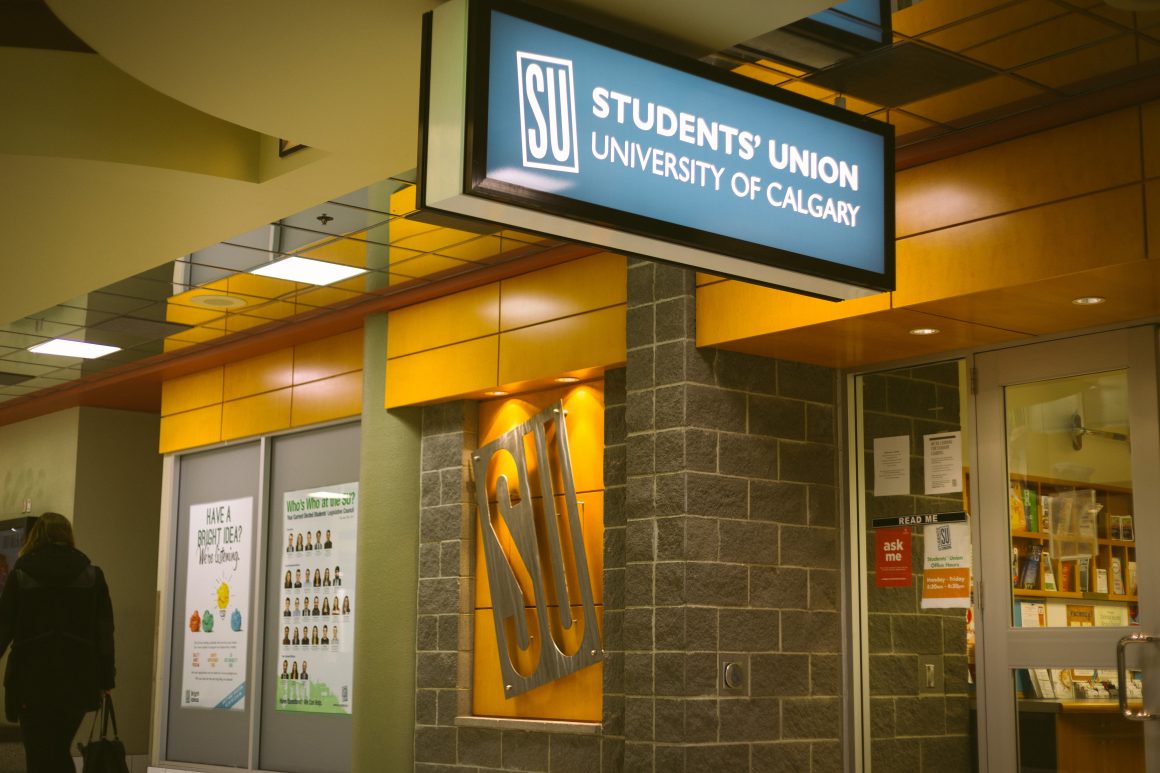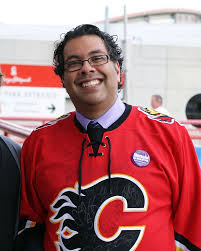
Four former Students’ Union presidents: Where are they now?
By Scott Strasser, February 27 2017 —
With the Students’ Union annual general election period in full swing, the Gauntlet decided to look back at a few former SU presidents and see what they’ve been up to since their time at the University of Calgary. We delved into what issues and initiatives characterized their terms as student leaders and how their experience shaped their future careers.
[hr gap=””]
Hardave Birk: 2012–13.
As SU president, Hardave Birk laid the groundwork for the MacHall lease negotiations between the SU and the U of C. The dispute over the building’s ownership eventually culminated in the current lawsuit.

Birk said he consulted with 6,000 students regarding the future of MacHall // Gauntlet archive photo
His term as president was characterized by other MacHall contract negotiations as well. He renegotiated the SU’s food court agreement with Pepsi and a contract with the university over space agreements in the building.
Birk also led a large student consultation regarding the future of MacHall after university administration proposed to redevelop the building in 2012. Birk organized surveys, townhalls and forums to garner student feedback on the building’s future. He said more than 6,000 students — a quarter of the U of C undergraduate population — engaged in the consultation.
“That set a groundwork and a basis for what the SU is still advocating for to this day on what we think the future of the building should be,” Birk said.
Before he became president, Birk was the SU vice-president external in 2010–11. He said his biggest accomplishment during that period was lobbying the provincial government alongside other members of the Council of Alberta University Students to amend the provincial Elections Act.
“[We] secured a meeting with the Minister of Justice at the time, Jonathan Denis, and convinced him to make the change to the Elections Act to make it easier for students to pick their own residency where they vote,” Birk said.
After graduating from the U of C, Birk moved to Ottawa to work for Canadian Senator Doug Black — the former chair of the U of C Board of Governors.
Birk worked under Black for three years in various roles, starting as a legislative assistant before being promoted to policy advisor, then director of policy. While working for Black, Birk completed a Masters degree in political management at Carleton University.
After nearly three years working in Black’s office, Birk left Parliament Hill in 2016 for a position with the Federation of Canadian Municipalities (FCM). For the last six months, he has worked for the FCM as a government relations advisor, helping the organization’s board members advocate at the federal level.
[hr gap=””]
Bryan West 2004–06
Bryan West’s two years as SU president were characterized by large-scale initiatives at the U of C that remain in place to this day.
During his time in the SU, West played a role in persuading the provincial government to implement the current inflation-tied tuition cap — a cap on tuition fee increases set to the Canadian Consumer Price Index. Outside of a tuition freeze like the one currently in place, this cap still applies to all 26 public post-secondary institutions in Alberta.

SU president Bryan West (left) // Gauntlet archive photo
West said that during his early days as SU president, budget cuts from Ralph Klein’s Progressive Conservative government and tuition fee increases as high as seven per cent a year were a constant worry for students. To fight these issues, the SU started a “war chest” with funds that went towards television commercials and print advertisements. He said the goal was to get student issues on the minds of voters and candidates leading up to the 2004 provincial election.
“We had tracking data at the time showing the various issues that people were talking about and education had started around number 60,” West said. “By the time the election rolled around, we had gotten it up to issue number one or two.”
While Klein’s PCs still won the election that year, the party lost several seats in Calgary — notably in ridings that included post-secondary institutions. To compensate for his loss of support among post-secondary students, West said Klein made sure to better address post-secondary issues from then on.
“[Klein] promised to address education because he had lost all the ‘university ridings’,” West said. “He implemented a tuition freeze, [reshaped] the ministry of advanced education and appointed Dave Hancock to lead that. They started a review, increased funding to all the universities and then eventually, the product of that review was that they pegged annual tuition increases to CPI.”
On a hyper-local level, West helped forge the Quality Money program in 2004, which is a partnership between the SU and the U of C that provides approximately $1.7 million per year in funding towards on-campus initiatives. The program is still popular and was recently approved by the Board of Governors to continue until 2021.
After graduating from the U of C, West attended law school at Queen’s University. Following his time at law school, he moved back to Calgary to work as an associate for Bennett Jones LLP. His work for Bennett Jones focused on employment and commercial litigation, including construction, contract, partnership and real estate disputes.
Following nearly three years working for Bennett Jones, West made the switch to McCarthy Tétrault in March 2013. He is currently a senior associate at the commercial litigation firm, acting for developers, energy companies, engineering firms, commercial landlords and other clients. He also contributes regularly to the Canadian Real Property Law blog.
[hr gap=””]
Naheed Nenshi 1993–94
Calgary’s current mayor is easily the most famous SU alumnus. But years before the prestige of leading city hall, Nenshi held the only slightly less prestigious position of SU president from 1993–94.
A major issue facing students in 1993 was the Board of Governors’ approval that June of a cost-recovery Master’s degree program in accounting (M.Acc). The program was set at $10,000 per semester, which was intended to go towards the recovery of the program’s operating costs.

While he was SU president, Nenshi tackled a contentious Master’s in Accounting degree approved by U of C administration // Courtesy public domain
In July 1993, Nenshi and the rest of Students’ Legislative Council argued that the M.Acc program violated Alberta’s tuition fee policy by “[placing] unacceptable financial demands on students [and discriminating] against students who do not have the financial resources to enter a cost recovery degree program.”
The SU campaigned to send a message to the provincial government and U of C administration that students were against the M.Acc and other cost-recovery programs.
“This campaign is a way to ensure the Minister of Advanced Education knows that students are concerned about cost-recovery,” Nenshi said in a July 22, 1993 Gauntlet article. “I think it’s really part of the whole larger issue of the tuition fee cap and deregulation and it has to be considered almost as a package.”
Another issue during Nenshi’s tenure in the SU was the “parking pass debate.” According to Gauntlet archives, some members of SLC were upset that the SU executives received free parking passes on campus, stating it was elitist.
After graduating with a Bachelor’s in Commerce from the U of C in 1994, Nenshi pursued a Master’s degree in Public Policy at Harvard University. He later worked at management consulting firm McKinsey & Company for three years.
In 2001, Nenshi founded the Ascend Group consulting firm, which advises non-profit, public and private organizations. He also started work in 2004 as an associate professor and instructor in nonprofit management at Mount Royal College — now Mount Royal University.
Nenshi entered politics for the first time in the 2004 Calgary municipal election, but was unsuccessful in winning a seat on city council.
After six years as an instructor at MRC, Nenshi ran for mayor in 2010 under a social media-heavy campaign dubbed “the Purple Revolution.” It was a non-conventional approach to political campaigning at the time, but Nenshi was successful and became the first Muslim mayor of a major North American city. After three years of relatively-high approval ratings, he ran for a second term and was re-elected in 2013.
Though his approval ratings have dipped slightly since his early years in office, Nenshi is currently running for a third term as Calgary’s mayor in this fall’s municipal election.
[hr gap=””]
Patricia Ruby, 1976–77
It took 10 years of being an independent institution before U of C students elected the first female president of the SU — Patricia Ruby.
“We had a really diverse council,” Ruby said. “The vice-president services was a quadriplegic and we had a first-generation [Chinese immigrant] as a vice-president academic. And I was a woman. We had a real diverse bunch and we used it to our advantage.”

According to Ruby, student housing was a priority for the SU in 1976 // Gauntlet archives
According to Ruby, student housing was a priority for the SU in the mid-1970s, due to only a few residence buildings existing on campus and the fact the university was still fairly isolated from the rest of the city. She said the SU fought to take over a housing registry service from U of C administration.
“People were sleeping in their cars and there just wasn’t accommodation at that point,” she said. “The housing was not anywhere close to the university, which was still relatively new.”
Another successful initiative during Ruby’s period in office was the creation of a teaching excellence award — a precursor to the current SU Teaching Excellence Awards.
“Faculty members and administration felt students would only rate people highly if they gave easy marks,” Ruby said. “We had to be really rigorous about that.”
Ruby also attended the U of C for graduate school, earning an MA in Social Work in 1980. After various jobs across western and northern Canada, she founded the consulting firm PM Ruby Consulting Inc. in 1983. For the last 33 years, Ruby has led the Calgary-based organization as president.
“We try to work on how different and often conflicting groups can work together to develop governance structures for [things like] watersheds or otherwise work out ways they can agree on policy,” she said.
Throughout her time with PM Ruby Consulting, she has also held positions as a socio-economic advisor on the National Energy Board, a senior advisor in public affairs for the Amcoco Canada Petroleum company and was a TransCanada lead on the Alaska Pipeline Project.
